
UNESCO raises alarm over threats to Bukhara’s historic integrity
In a recent statement, UNESCO has expressed concerns that Uzbekistan has not adhered to its commitments regarding the development activities around the historic city of Bukhara. The city, a UNESCO World Heritage site, is renowned for its well-preserved medieval Islamic architecture and urban fabric, which has remained largely intact for centuries.
The controversy stems from the Uzbek government’s recent construction and demolition work near Bukhara’s historic zones. UNESCO claims that these activities were undertaken without the agreed-upon master plan, which was supposed to guide development in a manner that preserves the city’s outstanding universal value.
Bukhara, which sits on the ancient Silk Road, is more than 2,000 years old and has been an important economic and cultural center in Central Asia. The city’s architecture and urban planning, particularly from the Sheibanid dynasty, have had a profound influence on the evolution of towns across the region.
Despite its historical significance, Bukhara has faced challenges balancing preservation with modernization. The city joined the UNESCO Creative Cities Network, recognized for its dedication to preserving and promoting culture through handicrafts and folk art. This inclusion was seen as a step towards fostering sustainable tourism and development while safeguarding its cultural heritage.
However, UNESCO’s recent allegations suggest a breach of trust and a potential threat to the integrity of Bukhara’s heritage. The organization has called for immediate action to halt the unauthorized work and to re-establish a dialogue on the master plan’s implementation.
The Uzbek government has yet to respond publicly to UNESCO’s claims. The situation raises questions about the effectiveness of international agreements in protecting cultural heritage sites and the challenges nations face in managing development pressures.

